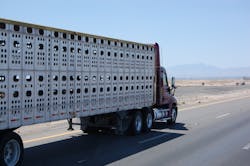The Federal Motor Carrier Safety Administration (FMCSA) has granted motor carriers hauling livestock a one-year exemption from the 30-minute rest break provision of the hours-of-service (HOS) regulations. The exemption approval is scheduled to appear in the June 11 Federal Register.
Last June, the National Pork Producers Council (NPPC) on behalf of a number of livestock industry groups asked for a 90-day waiver followed by a two-year exemption. FMCSA granted the waiver subject to terms and conditions on July 11, 2013, but it had not yet acted on the exemption request. NPPC had argued that during summer months in particular, exposure to heat was a major concern for animals’ well-being – especially for the transportation of pigs, which cannot sweat. Industry guidelines, therefore, direct drivers to avoid stopping in temperatures greater than 80 degrees except for unloading or if necessary for safety reasons.
In its latest action, FMCSA said that the exemption, subject to terms and conditions, will achieve a level of safety equivalent to or greater than the level that would be achieved absent such an exemption. The real-world experience of the industry’s operations under the limited 90-day waiver supports that conclusion, FMCSA said. The agency’s exemption preempts inconsistent State and local requirements.
FMCSA limited the term of the exemption to one year rather than the requested two years and required carriers using the exemption to report any accidents to the agency. Only carriers that are unrated or have a satisfactory safety rating may use the exemption, which would be eligible for renewal consideration at the end of the one-year period.
An estimated 66,316 motor carriers operating 196,398 vehicles and employing 252,540 drivers haul livestock. But more than half of those drivers – 130,896 – operate within a 100 air-mile radius of their work-reporting location and are exempt from all HOS requirements. FMCSA also concluded that given a low number of fatal crashes involving carriers transporting live animals – 20 crashes for an industry sector that currently includes 66,316 active carriers – there would be no decrease in safety for the traveling public.
